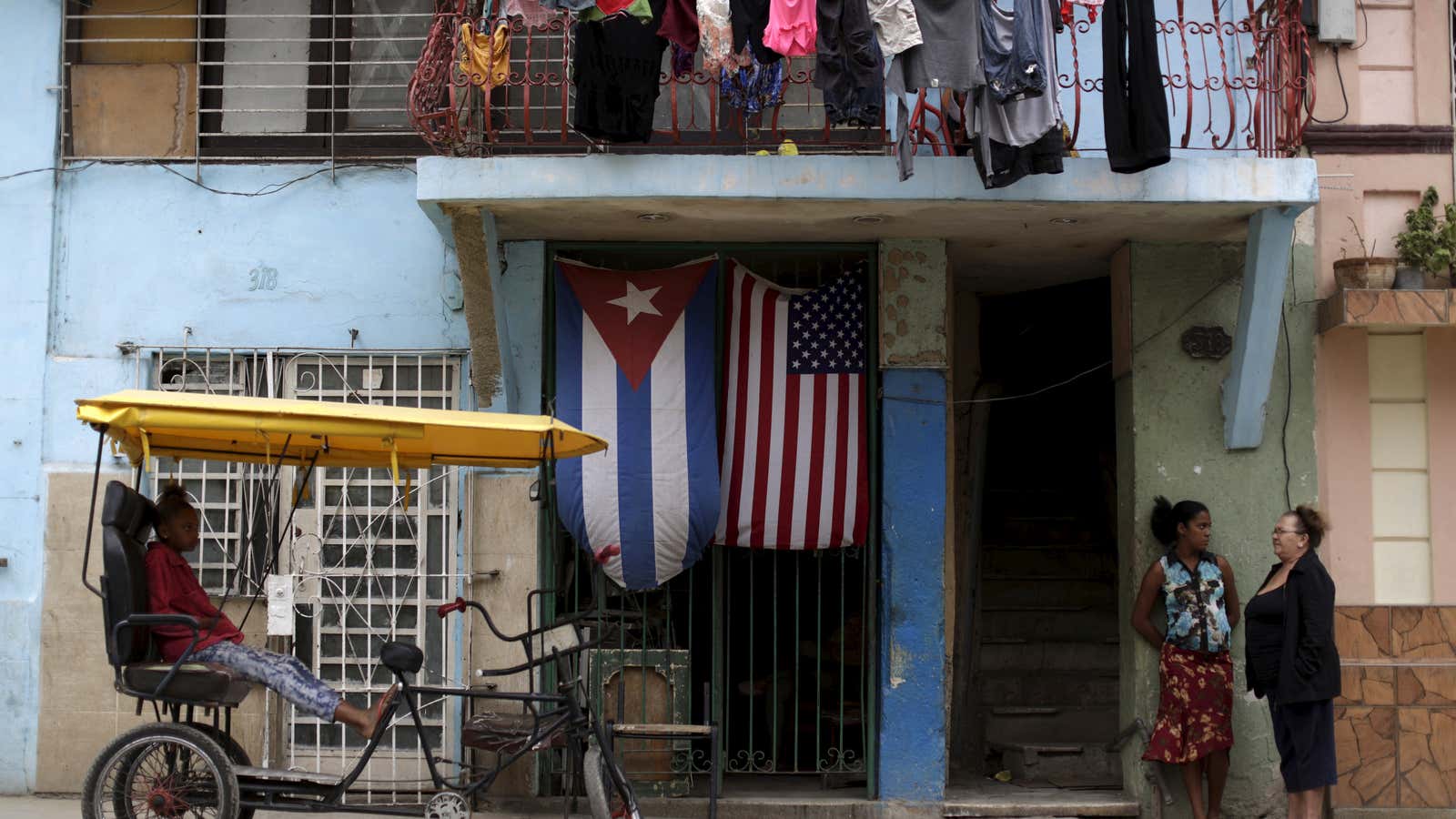President Obama spoke directly to the Cuban people this week during a three-day visit to the country’s capital–the first of a US president in 88 years. He claimed he was there to “bury the last remnant of the Cold War” and “extend the hand of friendship” to Cubans after years of estrangement between the two countries. For young Cuban-Americans like myself, this period of isolation has been in place our entire lives.
Obama’s historic speech called on Congress to lift the 55-year-long US-imposed embargo, stating, “what the United States was doing was not working… the embargo was only hurting the Cuban people instead of helping them.” The Bay of Pigs, an unsuccessful invasion attempt by the US to overthrow Cuba’s government, happened the same year Obama was born—the same year my mother came to Miami from Havana at age 9. The embargo followed a few months after.
Some US politicians have since condemned Obama’s engagement with a communist government. It is certainly true that Cuba’s leaders must not be let off the hook for the political prisoners that human rights groups say remain imprisoned in island jails. But Obama believes, as do I, that democracy and change can come to the Cuban people through a policy of economic exchange and openness. While Cuba still ranks poorly in terms of individual freedoms, the country is starting to change. And we want to be a part of that transition.
Fidel Castro overthrew then-dictator Fulgencio Batista in 1959. He quickly began nationalizing industries and properties across the country, including my family’s. My grandfather, a supporter of the revolution and political prisoner under Batista for two years, remained skeptical of Castro and his policies. Like many other revolutionaries, he wanted democracy for Cuba. But when it became apparent that Castro wouldn’t hold free elections, he started to look for ways to get his family out. After the Bay of Pigs, my grandfather was accused of helping the Americans invade, and our family separated.
My grandfather went into hiding until he was able to make it to Miami through Panama in 1962. My mother and grandmother applied for visas to leave the country in June and flew to Miami in November of 1961. Her two brothers came over separately. Teo, a Naval Academy student, sailed a ship with 27 people aboard to Key West a month after the invasion. Her other brother, Herminio, came to the US in the Peter Pan Operation, which put displaced children in shelters or with families until they could be reunited with their own. A little over a year after the Bay of Pigs, all five were reunited in Miami. My mom and grandmother didn’t speak a word of English. And yet they started a new life 90 miles and a world away from the one they had known, with the understanding that they might never be able to go back.
My immediate family was able to find each other in the US, but they left extended family, friends, and possessions behind. While Obama has started to ease restrictions, the call to end the embargo is something many Cubans and Cuban-Americans never thought they would hear in their lifetimes. I didn’t expect to hear it in mine. The embargo prevented the US and Cuba from exchanging commerce, trade and ideas. The travel ban stopped many displaced Cuban-Americans from going home for over 50 years.
But privately run small businesses have been growing in Cuba ever since President Raul Castro altered restrictions on entrepreneurial ventures in 2010. A large number of people starting and working for those small businesses are young Cubans—about 30% of registered autonomous workers as of May 2015, according to Fox News. They now have a real chance to change the direction of their country. As Obama said in his speech: “I’m appealing to the young people of Cuba who will lift something up, build something new.”
But just as he’s calling on young Cubans to “look to the future with hope,” Obama is also speaking to young Cuban-Americans who have long been separated from their country of origin. He’s asking us to re-engage with our roots, and to share the democratic ideals we’ve grown up learning with our brothers and sisters on the island. He said, “this is about family—the memory of a home that was lost; the desire to rebuild a broken bond.”
It takes two sides to rebuild a bond. With the easing of restrictions between Cuba and the US, it’s our job as Cuban-Americans to re-invest in a home that’s been closed off to us. Now is our time to engage with them by sharing our ideas, businesses and beliefs. Moments like these don’t come around often. Let’s not waste it.
